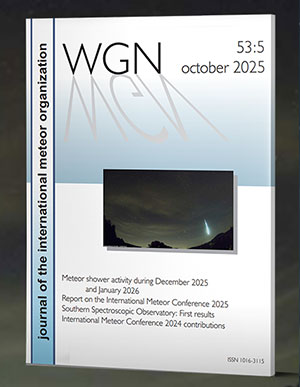The meteor shower of the eta-Aquarids is not easily observed from
mid-northern latitudes where the majority of visual observers is
located, because of the very late rising of the radiant before
dawn, and fewer amateurs are observing from the southern hemi-
sphere where dawn is much later, and the radiant climbs higher
before the end of the meteor watch.
It is therefore even more challenging to produce a meaningful
activity graph of the eta-Aquarids quickly after their maximum,
and I am very grateful for the immediate submission of the reports
by the observers, which are stated at the end of this post.
The gradual increase of activity is nicely show in the below
Table. The maximum time is, however, hard to fix because of a
severe dip in the UT morning of May 6 when the ZHR fell below
half-value of its neighbours. Maximum ZHRs appear to be at the
lower end of previous years’ typical values of 60-70 per hour.
----------------------------------------------- Date Time (UT) Sol. nETA nObs ZHR +/- ----------------------------------------------- Apr 29 1800 39.71 1 2 2.4 1.7 Apr 30 1640 40.63 2 1 20 11 May 01 1730 41.64 25 3 24 4.8 May 03 0050 42.90 23 4 36 6.1 May 04 0840 44.19 15 3 38 9.5 May 04 1750 44.56 14 4 50 13 May 05 1330 45.35 80 5 49 5.5 May 06 0530 46.00 12 5 24 6.8 May 06 1610 46.43 119 6 51 4.7 May 07 0530 46.96 19 4 25 5.7 -----------------------------------------------
Solar longitudes refer to equinox J2000. Average times are given with
10-minute accuracy though often refer to many hours coverage. The
average ZHR was computed by <ZHR> = sum n / sum(Teff/C) where Teff is
the effective observing time, C is the total correction according to
limiting magnitude, possible field obstruction and radiant elevation
as sin(hR). The ZHR refers to a limiting magnitude of +6.5 and a
radiant elevation of 90 degrees. nETA is the number eta-Aquarids seen,
nObs is the number of observing periods contributing to the average;
the number of individual observers is smaller in most of the cases.
I am very greatful to the following observers for their submission and therefor contribution to this article:
DAVMA Mark Davis (USA),
JOHCA Carl Johannink (the Netherlands),
LANMA Marco Langbroek (the Netherlands),
LINMI Mike Linnolt (USA),
MARAD Adam Marsh (Australia),
MARPI Pierre Martin (Canada),
MATMI Michael Matiazzo (Australia),
MCLAL Alex M’clintock (Spain),
MISKO Koen Miskotte (the Netherlands),
MOSSC Scott Moser (USA) and
YOUKI Kim Youmans (USA).



 You saw something bright and fast? Like a huge shooting star? Report it: it may be a fireball.
You saw something bright and fast? Like a huge shooting star? Report it: it may be a fireball.  You counted meteors last night? Share your results with us!
You counted meteors last night? Share your results with us!  You took a photo of a meteor or fireball? You have a screenshot of your cam? Share it with us!
You took a photo of a meteor or fireball? You have a screenshot of your cam? Share it with us!  You caught a meteor or fireball on video? Share your video with us!
You caught a meteor or fireball on video? Share your video with us!